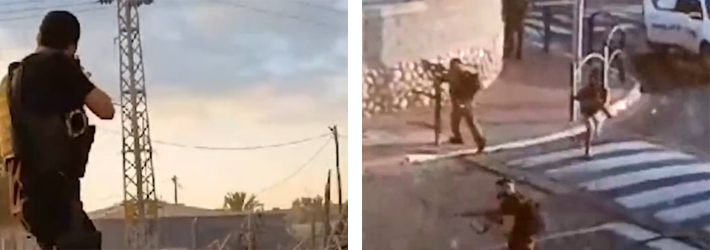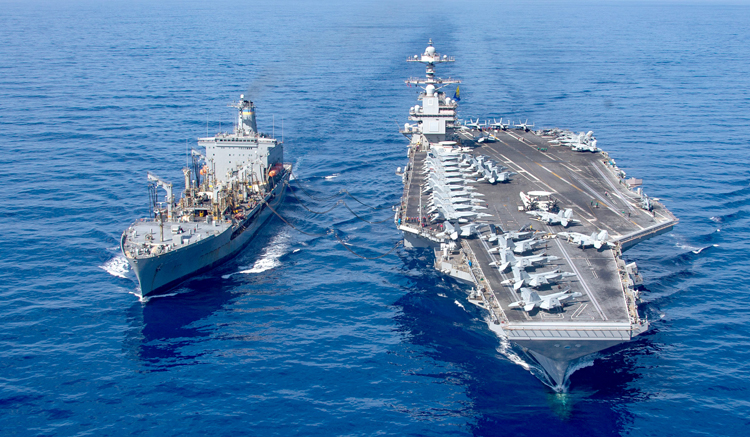INDIAN ARMED FORCES CHIEFS ON
OUR RELENTLESS AND FOCUSED PUBLISHING EFFORTS

SP Guide Publications puts forth a well compiled articulation of issues, pursuits and accomplishments of the Indian Army, over the years

I am confident that SP Guide Publications would continue to inform, inspire and influence.

My compliments to SP Guide Publications for informative and credible reportage on contemporary aerospace issues over the past six decades.
Lessons from the Israel-Hamas War
Unraveling the Complex Lessons from the Israel-Hamas Conflict
 |
The Author is Former Director General of Information Systems and A Special Forces Veteran, Indian Army |


October 7, 2023, was the blackest day in Israel's history, with multiple Hamas attacks by air-land-sea backed by 3,000 rockets that killed 114 IDF personnel and civilians, taking temporary control of some areas/military posts and took back a large number of hostages to Gaza. Israel's AI-enabled surveillance and intelligence system was easily circumvented despite Egypt's foreign minister telling Israeli PM Benjamin Netanyahu 10 days earlier that something "big" was about to happen. Saudi Arabia also warned of an "explosive situation building up with Palestinians deprived of their legitimate rights."
Israeli intelligence (known globally one of the best) had no inkling of thousands of Hamas fighters planning to cross into Israel? It is said they came to know only a day earlier but didn't alert the border, which is difficult to digest considering IDF-Hamas hostility. The 'Five Eyes Alliance', which blamed India for Nijjar's killing, knew nothing about the impending attacks? What about the CIA, with America developing a secret US military base in Israel atop Mount Har Qeren?
The asymmetry of Hamas' attacks challenges conventional defence strategies, prompting a reevaluation of global security preparedness.
Israel witnessed prolonged nation-wide protests after the government drastically curtailed powers of the judiciary. The US also was desperate to divert attention from its project in Ukraine. So, it suited both to let Hamas attack and then go after it full force although intensity of the attack was miscalculated?
Israel continues to bomb Gaza. Ground offensive has begun incrementally through the rubble-cum-built up areas but Hamas has a 500-km underground tunnel network. Israel has conducted airstrike in Lebanon and Syria and the US has also bombed Syria. Israel and Hezbollah are battling it out and rockets continue to be fired by Hamas-Hezbollah into Israel.
The conflict underscores the irreplaceable role of human intelligence and vigilance alongside technological surveillance in safeguarding national security.
Gaza is a human tragedy with paucity of food, medicines, medical facilities and meager aid, with water, electricity and communications cut off. Bombing of hospitals has made it worse. Palestine reports 8,000 plus killed and 13,000 plus injured in Israeli bombings. Israel plans to lay siege with tank-posts and continue Hamas-hunting, which will take a long time. The IDF will likely incur many casualties fighting through built up areas and tunnels which also hold hostages. With its tentacles and support base abroad, killing Hamas altogether is out of the question, while simultaneously fighting Hezbollah will split IDF resources.


(Above) A maze of tunnels used by Hamas in Gaza will present a significant challenge to the IDF
With two US carrier battle groups (CBGs) in situ, China sending six warships to the region, America warning Iran, China-Russia-Middle East united behind Palestine-Hamas and the US-led West backing Israel with military hardware, expansion of the Israel-Hamas War into a larger Middle East conflict is becoming a possibility. Veteran US Army Colonel Douglas McGregor warns that the US will bring Israel to destruction if it continues to raise the stakes in the Middle East.
The failure to share vital intelligence among agencies raises questions about the necessity for seamless cooperation to avert future crises.
The US apparently aims to reap strategic-economic benefits from this war – similar to in Ukraine. The POTUS Joe Biden has requested $14 billion in "new funding" for military aid to Israel. Two of America's largest defence contractors RTX (earlier called Raytheon) and General Dynamics have told investors that Israel's war on Gaza is "good for business" — one predicting its recent fourfold increase in artillery production will not suffice to meet additional demand. It is no secret that American foreign policy is heavily influenced by its arms, oil and pharma lobbies.
According to S&P Global Commodity Insights, the main suppliers of oil to Israel in 2022 were Iraq, Azerbaijan and Kazakhstan, as also small quantities from Nigeria and Gabon. Of these countries, the OIC includes Azerbaijan, Kazakhstan, Iraq, Nigeria and Gabon. Azerbaijan supplied $1.7 billion worth oil to Israel in 2022, Kazakhstan $777 million worth and the UAE $645 million. As of mid-May 2023, Israel imported about 2,20,000 barrels of oil a day, about 60 per cent of which came from the two Muslim countries. The OIC may stop oil supplies to Israel if it continues bombing Gaza. America can then supply oil to Israel at higher costs as it is doing to Europe by banning Russian oil.
Combatting within tunnels presents unique challenges, necessitating strategic innovation in dealing with subterranean threats.
A ceasefire and negotiating for a two-state arrangement through talks may be the solution of the Israel-Hamas War but both sides have rigid stands about whose land it is and who the occupier. Hamas cannot be totally wiped out as all other terrorist organisations have continued to survive, mutate and expand. Moreover, the Catch 22 is can a two-state solution end the violence? Remember Pakistan's terrorist-President Pervez Musharraf saying: "Even if the Kashmir issue is resolved, jihad against India will continue."

The lessons we can learn from the Israel-Hamas War, which is already running into the fourth week, are as under:
- Preparedness. October 7 was a Jewish holiday but it was also the 50th Anniversary of the 1973 Yom Kippur war. The latter demanded utmost vigilance – there was no room for laxity.
- Enemy Appreciation. Asymmetric attacks by Hamas, which is not a conventional force, needed constant appreciation, including worst case scenarios. These attacks would have been viewed globally and the possibility of such attacks against India needs examination. Terrorists for the 26/11 Mumbai attacks came by sea from Karachi and we not only have contested borders with China-Pakistan but also lightly held borders with other neighbours. As such, it would be naïve to expect such attacks through our border with Pakistan alone.
- Dependence on Technology. The man behind the machine will always remain far more important than the machine no matter what high-end technology is introduced. Fences and barriers must be manned or frequently patrolled in addition to electronic and surveillance means whose performance is subject to vagaries of weather, electronic suppression and other enemy actions.
- Intelligence Cooperation. It is difficult to understand why Israeli border units were not alerted on October 7, even if the information of the impending attacks was gathered by the Israeli intelligence a day earlier. Was it upmanship between intelligence agencies as is the bane in India? Take the IPKF operations in Sri Lanka where the national intelligence agencies were working at cross purposes to our military.
- Intel Warnings. In India, the States treat intel warnings most casually. There were intel alerts before the 26/11 Mumbai terror attacks, as well as before terrorist attacks in Uri, Pathankot Pulwama suicide attack and others, but were always ignored. In case of 26/11, locals who saw the terrorists getting off the boat even informed the nearby police but there was little action. We need to drastically change such attitudes.
- HUMINT. Operations in the two world wars and beyond have shown the importance of HUMINT and the role played by moles inside the enemy camp. Infiltrating terrorist organisations, though difficult, can give handsome dividends, this is very relevant to the Indian security establishment as well.
- Tunnel Warfare. Fighting through tunnels is complex. The US was unable to fight through the Sochi Tunnels where the Vietnamese fought from despite using defoliants and chemicals. POK has extensive tunnels developed by both China-Pakistan and recent reports indicate PLA digging tunnels east of Depsang in Ladakh. We need to develop our own tunnel networks with the preponderance of drones in the battlefield, and devise ways to tackle enemy tunnels.
- Soldiers and National Security. Ironically, we still don't have a national security strategy. Defending the nation is too serious a business to be left to bureaucrats/diplomats who are not accountable and will not be there when a crisis happens. Considering soldiers a drain on the economy should be anathema. We discuss expenses on soldiers without comparing them with other government services, not even civilian-defence employees who are four-times more expensive than their uniformed counterparts. And, concurrently boasting a $5 trillion economy by 2025 and $30 trillion economy by 2047.
- Geopolitical/Political Expediency. America has been historically igniting hotspots globally with scant regard even for its allies, one example being deteriorating economies of European nations because of the Ukraine war. The US doesn't want a ceasefire in Ukraine or Gaza. Politicians, world over, don't hesitate sacrificing their nationals for retaining or gaining power – call it criminalisation of politics or political expediency. India is no exception and we must live with this reality.
The conflict serves as a stark reminder of the geopolitical complexities that influence decisions, highlighting the need for a balanced approach in the pursuit of national interests.
Finally, the question is what our national priorities are, will we continue to put our soldiers and military manpower on the backburner in the din about technology and weapon systems, and what do we want to learn from the Israel-Hamas War.





